Sharing Balanced Education Policy with Future Educators

BOARD OF TRUSTEES
LEADERSHIP
WE ARE MORE THAN A THINK TANK.
WE ARE AN ACTION TANK AND A PUBLIC RELATIONS FIRM FOR LIBERTY.
A central role of an effective think tank is to produce quality research and analysis. Since 1985, we have provided research resulting in changes in law and policy. But we have never been content with just research. We are more than a think tank. We are an “action tank.” We put our ideas into action through groundbreaking litigation, coalition building, work on ballot initiatives, new media and investigative reporting. We don’t just fight on paper. We fight for freedom on the streets, in the statehouse, in the media, on the ballot, and in the courts.
The mission of the Independence Institute is to empower individuals and to educate citizens, legislators and opinion makers about public policies that enhance personal and economic freedom.
POLICY
COMPLETECOLORADO.COM

CREATIVE LABS/COMMUNICATIONS
DEVELOPMENT
FELLOWS
I’m writing this note well before the November 8th election and can only guess the results. But I’m willing to bet Dave Kopel’s next paycheck that our permanent income tax cut, Prop 121, passed comfortably and soon Coloradans will be enjoying a 4.4% tax rate.

You made that happen. You partnered with us because you think differently too.
You know that battling collectivism doesn’t happen in an election season or two. You know that the goal shouldn’t be electing personalities, though that may be an important step toward the goal. The mission is to change policy, change the law, and build a culture that protects those changes.
I’m assuming conservative politicians made huge gains nationwide on November 8th. Here in Colorado, conservatives should have made substantial gains, perhaps smaller ones, too. They’ll need a strong Independence Institute to remind them their job isn’t to get re-elected. Their job is to free Coloradans to make their own decisions. Do that, and re-election get easier.
When I say that you and the II team think differently, this is what I mean. We know that politics is the lagging indicator of culture. As culture goes, so eventually goes our policies and laws. To try to change policy without changing culture is ultimately futile.
It would be arrogant and fool-hardy to think our one organization, no matter how impactful, could change all culture. So, we focus on what we call “political culture,” the highly leveraged aspects of the political sphere that most influence political outcomes, like media, coalition build ing, recruiting, investigative reporting, lobbying, training, communication and research.
You’ve heard me talk about the long-term, infrastructure building we at Independence do to bend the political culture in Colorado towards liberty.
Here’s a small example of what I mean. It’s worth the short trip.
I opened the Denver Gazette the other day and read a front-page story about how transportation planners in Denver were planning to divert hundreds of millions of dollars away from needed highway projects and put them instead to social engineering transit and bike lane projects, making our traffic congestion worse. There was also a story of how Jared Polis’s 100% renewable energy goal by 2035 could cost lives due to power outages.
These two stories are powerful tales of the left running amuck and hurting Coloradans, and thank goodness the Gazette is there to tell them. As we constantly say here at Independence, cul ture is the leading indicator of politics. The media is a major influencer on culture, particularly political culture.
The reporter for both those stories was Scott Weiser. Before being hired by the Gazette he worked for Complete Colorado, our online news service. Scott wasn’t really a reporter when we hired him, but three years of working under the steady hand of our Mike Krause, the editor of Complete, his talents were noticeable enough that the Gazette wanted to poach him from us. He got called to the big leagues.
Reporters are overwhelmingly liberal; therefore, the media is overwhelmingly liberal, therefore culture is liberal and politics, well, it explains Colorado. Most people complain about the media. Thanks to your partnership with us, we find people like Scott, hone their skill, and help them better and bigger platforms.
Imagine as our partnership grows and our long-term infrastructure builds how many more reporters may be hired into the mainstream and how low our income tax may go. Maybe to zero?
Think Freedom,
We think differently. We fight differently. It’s why we win.
K-12 Policy Roundtable: Equipping Future Educators with a Balanced Perspective of Education Policy Issues
By Pam BenignoAfter education majors graduate from college and enter the public school system, they are bom barded with negative narratives about charter schools and other reforms without hearing about the benefits. Additionally, they may be expected to teach subject matter that conflicts with their beliefs and values.
For nine election cycles, The Education Policy Center has hosted school board candidate policy briefings so that candidates may hear a balanced perspective on education reform issues before they are elected. We decided that future teachers also need a similar opportunity before they enter the classroom.
The K-12 Policy Roundtable was launched in the fall of 2021 to help prepare teaching candidates. Firstly, as a pilot program, holding monthly evening meetings with Colorado Christian University (CCU) education majors. We discussed charter schools, private school choice, union member ship, and controversial education policy topics. Students read and discussed legislative bills and learned how policies adopted at the state legis lature, Colorado State Board of Education, and local school districts influence what they teach in the classroom.
Trying not to discourage them from entering the public education field, I shared with them more recent education laws and school district poli cies demonstrating the increased cultural accep tance of postmodern theories such as Critical Race Theory and Queer Theory. For instance, House Bill 19-1192 has “applied” Critical Race Theory to Colorado’s social studies standards and introduced sexuality into history lessons. The new law has propelled radical teacher-in-service training such as CU Boulder’s program, “A Queer Endeavor.” One session during their 2021 Educator Institute for Equity and Justice, which 450 metro teachers attended, made vicious attacks on Christianity. Another session explained how to “queer” elementary classrooms.
CCU Dean of the School of Education, Debora Scheffel, suggested that the K-12 Policy Roundtable take a new form in the fall of 2022 to benefit more students. She invited me to give presentations during daytime classes. There will be seven classes this fall, and discussions about current edu cation legislation will be added during the spring semester.
I am convinced that there is no way for public school educators to avoid the extreme politiciza tion of the K-12 public system altogether. The K-12 Policy Roundtable equips future educators to face controversial curricula and teacher professional development by hearing both sides of an issue before they enter the teaching field. Our classroom discussions also allow students to think through how to manage uncomfortable topics they may be required to teach and the importance of carefully choosing a district and school. The K-12 Policy Roundtable is a small step toward helping liberty-minded teachers retain their values while they educate our children and grand children, but it is a step.
Pam Benigno

Energy Policy with an Eye Towards Reliability
By Jake FoglemanJust days after finalizing a future ban on the sale of gas-powered vehicles, the California Independent System Operator (CAISO) sent out an emergency bulletin warning residents that an expected heat wave posed serious threats to the reliability of the state’s electric grid.
With adequate electric generation capacity in doubt, the ISO warned residents of the potential for blackouts and called for “energy conservation” measures (i.e. telling people they can’t use power during a heat wave).

Fortunately for California, it escaped calamitous blackouts this time. But the incident highlight ed the folly of pursuing green policies at all costs and underrating grid reliability.
The state had just passed a ban on gas-powered cars and then told residents not to charge their electric vehicles. Over 50 California cities (and counting) have banned natural gas, and yet resi dents were told not to use electrified appliances and air-conditioning.
Meanwhile, the state continues to scorn its existing natural gas and nuclear facilities despite them being the two most reliable sources of generation that can fully support a heavily-electri fied population. It’s a recipe for disaster.
When you choke out the supply of reliable generation capacity while simultaneously subsidizing the demand on an increasingly unreliable grid, you’ll get looming blackout threats.
Colorado is not yet so far down this rabbit hole compared with California, but it is well on its way. Our governor has committed the state to a 100% renewable energy standard by 2040, despite doubts from experts on both the right and left that such a standard is even physically possible to meet. State regulators have already begun placing regulatory constraints on future natural gas generation, while the Colorado General Assembly just passed a bill last session that sets the stage for building electrification.
Traditional baseload plants continue to be retired and are slated to be replaced mainly with intermittent renewable generation. At the same time, state lawmakers have thus far rejected efforts to explore advanced nuclear to fill the gap in reliable generation.
Already such measures are starting to affect grid reliability. Earlier this September, Xcel Energy made national headlines when, due to an emergency outage at one of its plants, it locked out 22,000 customers in Colorado from adjusting their thermostats as temperatures rose into the 90s. With no firm capacity to spare, such drastic measures were necessary to avoid rolling blackouts.
And now, thanks to an overreliance on planned solar installations that supply-chain disruptions have scuttled, Xcel is reporting a nearly 300 MW electricity shortfall over the next two summers unless it can quickly add new generating resources to its fleet.
A Three-Pronged Approach to Defending the Constitution
By Rob NatelsonMidway into my 25 year career as a law professor, I decided to use my historical, legal, and lan guage skills in service to the U.S. Constitution. After all, liberty depends on the rule of law, and the Constitution is the “supreme Law of the Land.” When the Constitution is disregarded or distort ed, the rule of law—and therefore the cause of liberty—suffers.
Most of the damage the Constitution has incurred in recent decades has come less from conscious disregard than from distortion—that is, assuming or pre tending the document means something other than it really does.
My “Campaign for the Constitution” has three prongs. First, I have written a long series of scholarly articles that exam ine the background of constitutional words and phrases and explain what they meant to the framers who drafted the document and the public that ratified it. I tried to make each investigation as rigorous and honest as possible, and I published my findings whether I liked them or not. You can see the complete list of articles on the II website at i2i.org/constitu tion/articles-books-by-rob-natelson/
Second, I began a program of public education about the Constitution. This included writing two books—The Original Constitution: What It Actually Said and Meant for a lay audience and The Law of Article V, a book about the amendment process for a more specialized audience. This program of public education included composing regular op-eds on the Constitution, notably (but not exclusively) for The Epoch Times, and giving presentations, both within and outside of Colorado. I no longer give speeches outside my two “home states” of Colorado and Montana, but I remain available for groups that wish to sponsor me for presentations within those states.
Third, in conjunction with II Research Director Dave Kopel, I drafted “friend of the court” briefs for the Supreme Court and appeals courts. We had some notable successes: We won on the two issues we addressed in the 2012 “Obamacare case”—although the law was upheld on an issue we didn’t write about. In the Supreme Court’s 2020 school choice case, we won a clear victory, as we did in the decade-long lawsuit that tried to void Colorado’s Taxpayer’s Bill of Rights (TABOR). This year I’ve produced, or am producing, scholarly articles on three subjects. They are:
• the limits on Congress’s power under the Commerce Clause (to be published in Federalist Society Review)
• the limits on Congress’s power under the portion of the Commerce Clause applicable to American Indians (already published in Federalist Society Review), and
• the source of Congress’s power to regulate immigration (accepted for publication in the British Journal of American Legal Studies).
All three articles correct myths about the Constitution and explain what the document really says.

Rob Natelson

Dolores Kopel: Rebel with a Cause
My mother, Dolores Kopel, passed away in August. Age 91 and ready to go, she was at home with her family, as she had wished. I would like to tell you about this woman who inspired me so much.
Dolores was an only child on a corn farm in Iowa. Her father, Cornelius, and her uncles had been world cham pion hog breeders, when their Spotted Poland China boar “Wildfire” came in first at the 1926 World’s Fair in Philadelphia. Dolores’s father was even more ambitious for her and told her she should be a lawyer. She never wanted anything else.
By Dave KopelYet when she was a junior at the University of Colorado, the law school made it clear that it did not look favorably on the notion of female lawyers; it was suggested that she should become a social worker. Instead, she transferred to the University of Denver Law School. There, she won the Henry Jaffa Award and finished at the top of her class. As with Sandra Day O’Connor’s top performance at Stanford, excellence mattered less than gen der, and so no law firm would hire her. She went into solo law practice.
At CU, she had been a reporter for the campus newspaper, The Silver and Gold, where she met city editor Jerry Koplowitz. After their first date, they dated six of the next seven nights, although many of their “dates” consisted of laying out the next day’s edition.
Jerry had been high IQ, low achievement, but after he met Dolores, everything changed. After a few years as journalist at the Rocky Mountain News, he switched to law, so he could spend all his time with her. When he graduated at the top of his DU Law class in 1958, they founded the firm of Kopel & Kopel.
They became nationally renowned bankruptcy attorneys, and also created the Colorado Bar Refresher, to help law school graduates prepare for the bar exam. In the Park Hill neighborhood of Denver, they became community organizers, helping lead the Park Hill Action Committee’s successful campaign for racial integration.
Jerry served eleven terms in the Colorado House of Representatives. Dolores became the first public interest member of the Colorado Real Estate Commission, and of the Collection Agency Board. In 1979, President Carter appointed her U.S. Bankruptcy Trustee for the districts of Colorado and Kansas. She implemented a pilot program that separated the administration of bankruptcy cases (for trustees) from the adjudication of such cases (for judges). Later, the pilot program was adopted nationwide.
Jerry and Dolores were the first married couple to serve as Governors of the Colorado Bar Association.
In the early 1980s Dolores was a mentor to a new lawyer named Diana DeGette. Later, DeGette served as Jerry’s campaign treasurer, in his final two races. After he retired, she won his seat, then won his former position as assistant minority leader, and soon aftter ascended to the U.S. House.
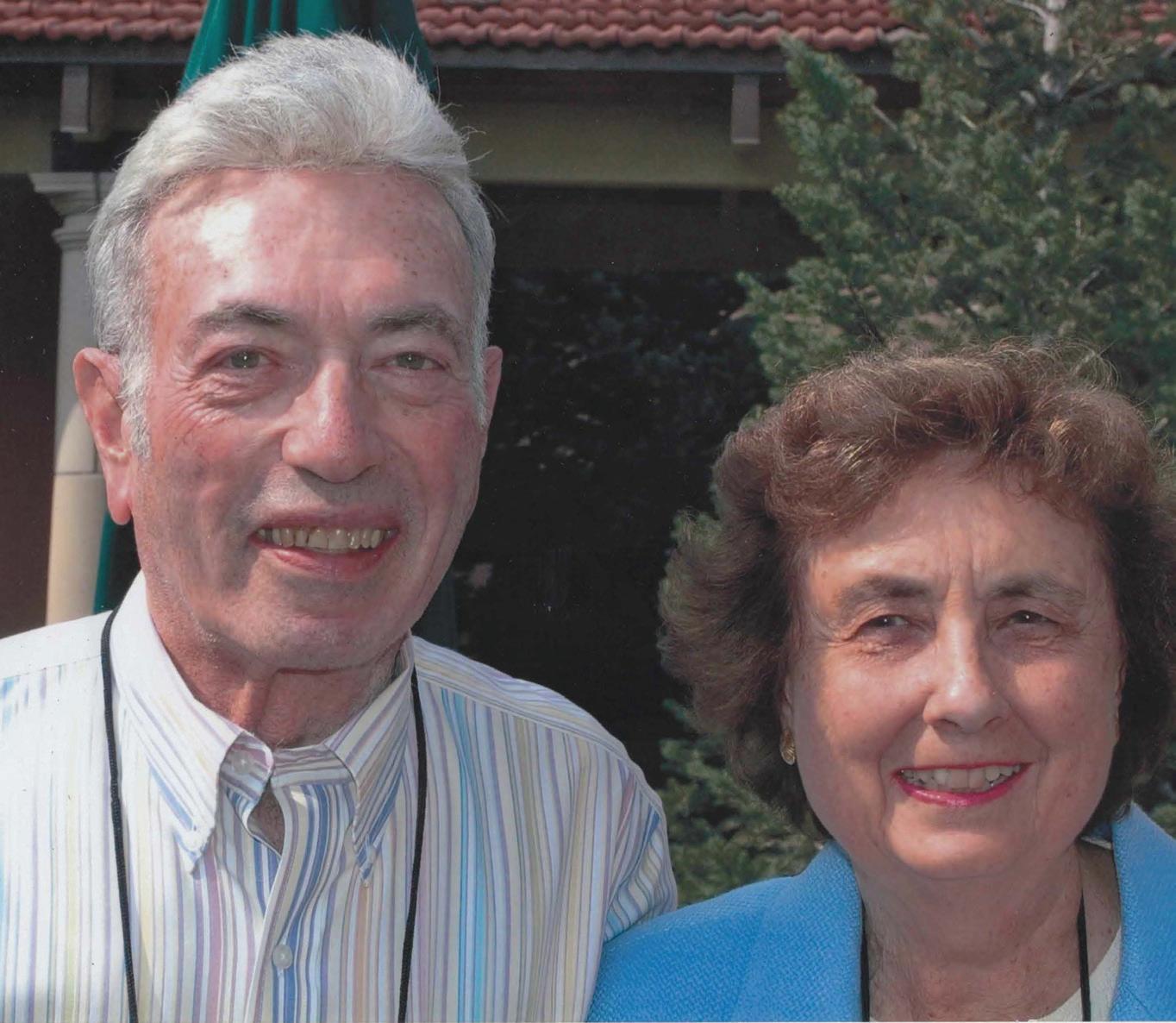
It Was All Fun and Games at the 20th Annual Alcohol,

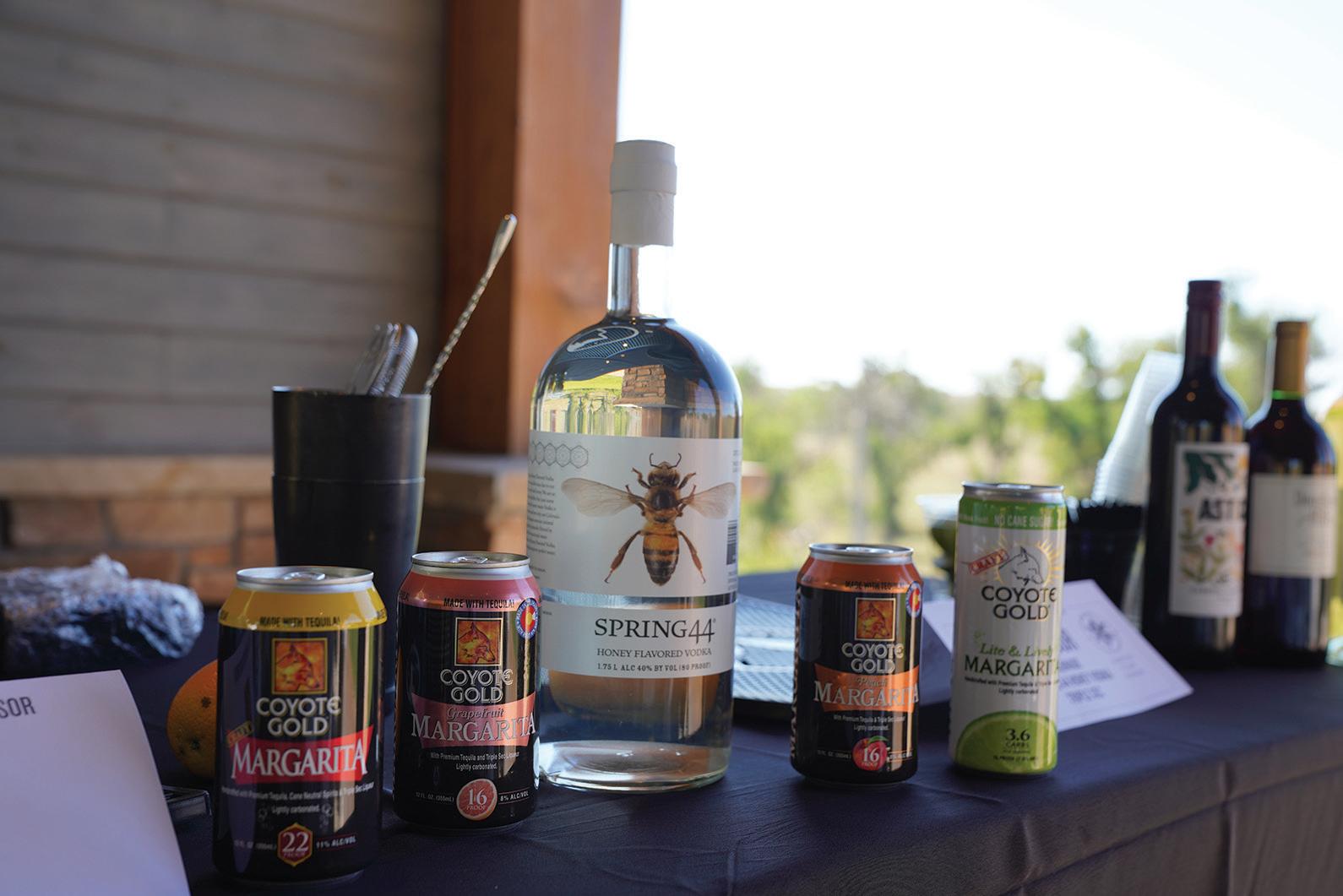


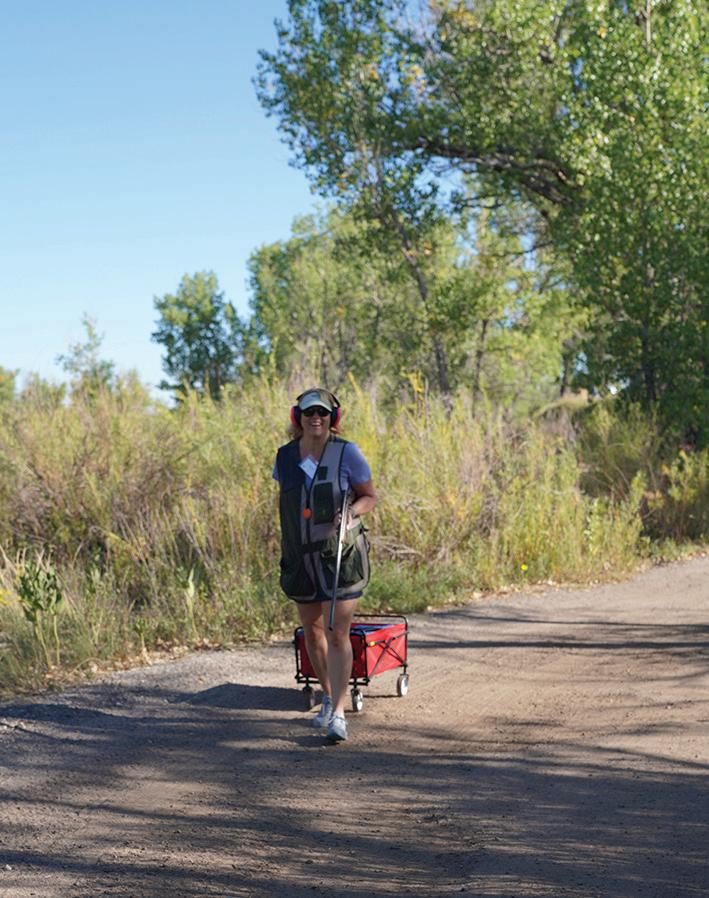



Tobacco & Firearms Party!
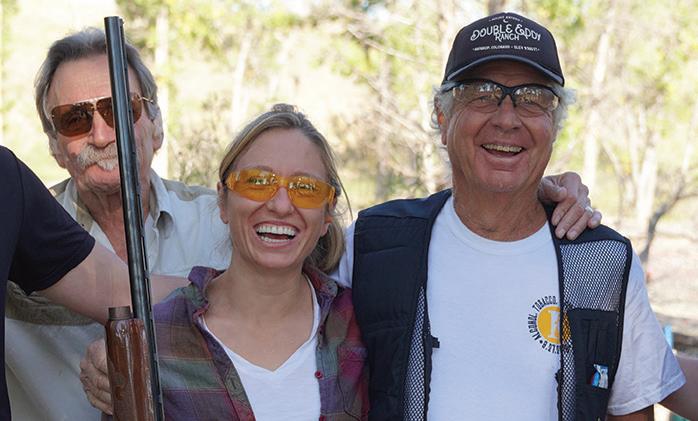

After the annihilation of thousands of clay pigeons, ATF Party attendees enjoyed cocktails, cigars and barbe que while listening to our speakers including Mandy Connell, host of The Mandy Connell Show on KOA 850 AM. Lunch was followed by an auction of donated items including an AR-15. Proceeds went to support FASTER Colorado, a program that trains armed school staff to protect children in the event of an active shooter.







What a Year for II’s FASTER Program
By Laura CarnoWhat a year it’s been for FASTER Colorado training! We have now trained school personnel from 41 of Colorado’s school districts in lifesaving skills and tactics to keep children as safe as they can be in their K-12 schools. We are grateful to our generous donors and sponsors for making sure that no school was kept from this world-class training because of lack of budget.
In the months since the horrific massacre in Uvalde TX, we have been inundated with requests from new schools. Not just rural schools, not just charter schools, but average-sized school districts. The details we all saw play out on our TV screens shook the nation, and the inquiries haven’t slowed down. Parents and grandparents know that the only people who could have save the children in that classroom in Uvalde were those two teachers inside the classroom. Is there anyone who thinks things would have gone worse if those teachers had been armed? They would have at least had a fighting chance.

Because of this significant increase in interest in armed school staff policies, and subsequent interest in FASTER Colorado, we have been expanding in a few key areas. First, we are increasing our ranks of law enforcement instructors to provide this world-class training. Our instructors are dedicated professionals who know that well-trained armed adults will make the difference in a mass shooting at a school. And they know that law enforcement can never be there in time. Second, because our FASTER Level-1 class is not a beginner class, we are adding firearms train ing companies to refer class members to, which will help get them ready for their level-1 experi ence. Third, we are looking to add more high-quality law enforcement training facilities around Colorado, so that we can bring class schedule options to more areas of the state.
All of this expansion means that we need our donors and sponsors even more. While larger districts have more budget flexibility than smaller rural districts, they often need scholarship support for their first year of training, as budgets are set a year in advance. If you would like to help sponsor scholarships, please contact Mary Goodley at Mary@i2i.org. If you would like to help with instruction, please contact Laura Carno at Laura@i2i.org.
Laura Carno
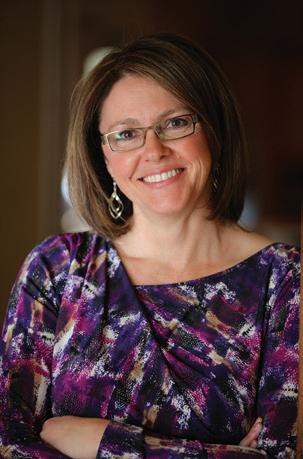
In October, Independence Institute welcomed former Colorado Senate Majority Leader Mark Hillman to its board of directors. “We’re thrilled to have a Trustee who knows a few things about both political races and actual horse races, given that afterwards you’re shoveling up the same stuff.” says President Jon Caldara. Hillman, 55, was elected to two terms in the Colorado Senate from 1999 to 2005 before being appointed State Treasurer.
“I’ve long appreciated the good work that the team at Independence Institute does to advocate for individual free dom and limited government,” Hillman said. “Organizations that stand for unchanging principles are essential to the conservative movement during – especially in the current era when some have neglected conservative principles to chase popular personalities.”
In elected office, Hillman was a leader in the fight to protect the rights of private property owners, to halt frivolous law suits, and using choice and competition to improve education and health care.
Hillman operates a family farm near the Kansas border where he grows wheat and raises horses. His writing on current issues has appeared in the Wall Street Journal, Colorado Politics, Denver Post and RealClearPolitics.com, as well as in numerous community newspapers across Colorado.
Since 2009, he has served as executive director of Colorado Civil Justice League, the state’s lead ing organization in the fight against lawsuit abuse.

He has served as a member of the Burlington School District RE-6J board of education, Plains Groundwater Management District, Colorado Horseracing Association, Colorado Thoroughbred Breeders Association. He is also a director for Leadership Program of the Rockies.
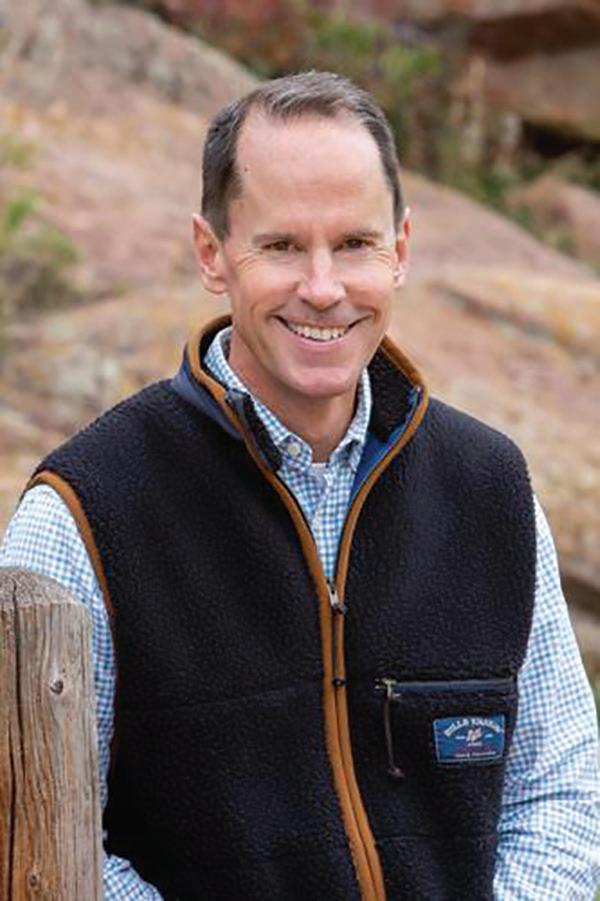
Energy Policy cont.
There’s still time for course correction, however. Natural gas capacity in the state is still adequate and growing slightly, despite efforts to the contrary. The state’s gas fleet should be allowed to continue operating until its baseload generation can be adequately replaced with the only clean technology capable of doing so at scale: advanced nuclear.
It’s all well and good to transition to cleaner energy, but doing too much too fast is a more imme diate concern. All Coloradans have a vested interest in ensuring the environmental vitality of the state, yet the same is true for the resiliency and abundance of the energy supply. Procuring and maintaining baseload generation is paramount.
Colorado has a chance to truly be the energy innovator it often fancies itself to be and chart its own course toward a carbon-free future with an eye toward reliability. The state does not have to copy California on everything.
Adopting California energy policies only gets you higher electric bills and blackout threats. Coloradans deserve to have the electricity they pay for arrive when needed. Be sure to stay tuned to https://i2i.org/energy/ to stay up to date on all thing’s energy. You can also follow the Energy Policy Center on Twitter @IndependenceE2P.
Jake Fogleman
Jake Fogleman is a research associate with the Energy and Environmental Policy Center. He is a cum laude graduate of Metropolitan State University of Denver where he studied political science and econom ics. Jake is a Colorado native.Reporter’s Notebook:
Why Complete Colorado Matters.
By Sheri PeifOne of the things Complete Colorado does better than the mainstream press is developing rela tionships with people who have otherwise developed a distrust for the media.
There are so many complaints these days about not getting both sides of a story in the news, and much of that is because many Coloradans no longer trust local media outlets. That is not the case with Complete.
I’ll be the first to admit that there are some who won’t return my phone calls either, but it’s almost always those in the hot seat for something, and they don’t want to talk about it because they don’t want it in Complete, not because they don’t trust me.
One recent example of what I’m referring to is the recall campaign against Senator Kevin Priola, who recently switched affiliation from Republican to Democrat. If you have been following the story in Denver media, you may not know much about the proponents of the effort. But if you’ve read Complete Colorado’s coverage, you’d know that the two people behind the recall are Senate District 13 residents Jeff Sloan and Louisa Andersen, who have dealt exclusively in their com ments with me.
Why? Because I live in Senate District 13 for one. I know the district. I know the players in the district, and in this case Sloan and Andersen know my history as a straight shooter. While they refuse to talk with other media outlets, they trusted me to accurately tell their side of the story. What is that story? Well, it’s not what you’ll read or see on any media site outside of Complete Colorado. Priola does not represent Senate District 13 at any level. For those that don’t know where Senate District 13 is, until the recent redistricting it consisted primarily of Greeley and Evans in the heart of Weld County.
Weld County is so conservative that the sheriff, the clerk and recorder, the assessor and two county commissioner seats are all up for election this year and the Democrats didn’t put up even one opponent. Five of the top eight seats at the county level are unopposed so all will remain in Republican hands. And at the state level, only one seat — House District 50 — is held by a Democrat, and that is expected to flip this November.
Currently SD 13 is represented by former Weld County Sheriff John Cooke, who represents the values and beliefs of the supermajority of his constituents. But Cooke is term limited, and his seat should have been up for election this year, but then redistricting happened.
The commission knew exactly what they were doing, drawing Priola, who represented Senate District 25 in Adams County, out of that district and into 13. Because the state Constitution does

not allow a sitting legislator to be drawn out of office, and because Priola was in the middle of a term, and Cooke was term limited, Priola will become the representative for SD 13 by default when the legislature reconvenes in January.
But then Priola flipped parties and became a Democrat, where both Andersen and Sloan said he always belonged anyway. The two told Complete what a majority of voters in SD13 thought of Priola: that he is not remotely conservative enough to represent them.
“We were willing to swallow hard and accept the fact that he may not have been our favorite and doesn’t support our Weld County values,” Andersen said. “But now he leaves us no alternative to put up a Republican. We were denied representation entirely as Republicans of Weld County and especially Greeley.”

Sloan agreed: “Priola’s positions and voting record are totally out of touch with the people of Weld County,” Sloan said. “He is so unacceptable to most of the people of Senate District 13 that we just can’t wait another two years for the next election to take place. He is too dangerous as a Senator for this district.”
That level of trust that led Andersen and Sloan to come to Complete extends outside of SD 13 as well. The confidence people have in Complete Colorado has led to my regular radio appearanc es on such programs as George Brauchler, Mandy Connell, Peter Boyles, Jimmy Sengenberger, Jimmy Lakey, and more. Building relationships is important to Complete Colorado’s success.
It has taken some getting used to, but it’s now hard to go anywhere in Colorado anymore without someone recognizing my name and thanking me for what we do at Complete. We don’t usually focus on breaking news, as we know it’s covered by everyone else. Instead, we tell the sides of stories others won’t. It’s just another reason why Complete Colorado matters.
Sherrie Peif
Congressional Record tribute, “They were the original ‘power couple’ long before dual careers were more outwardly prevalent and socially acceptable.” Or as former Colorado First Lady Dottie Lamm said at Dolores’s Celebration of Life, “Talk about a partnership marriage, and they were figuring it out in the mid-fifties, when most of us budding feminists were still struggling with it in the mid-seventies.”
To children and grandchildren, the best advice of Dolores and Jerry was expressed by example. Be yourself, think for yourself, and choose your own path forward based on your best judgment, and not on anyone else’s notions of what they think you are supposed to do. “It was us against the world,” she fondly recalled about the early days. “Us” did pretty well.
At her burial a few weeks ago, Reverend Steven Aeschbacher said, “Where Dolores was, there was more justice.”
One of Jerry’s campaign brochures promised, “An honest, decent voice for you.” Both Jerry and Dolores kept that promise.
Her parents, Cornelius and Bess Blanke, loved her wholeheartedly. Cornelius told her she should be a lawyer. Bess told her and everyone else that Dolores was “one in a million.” Both of them were right.
Dave Kopel
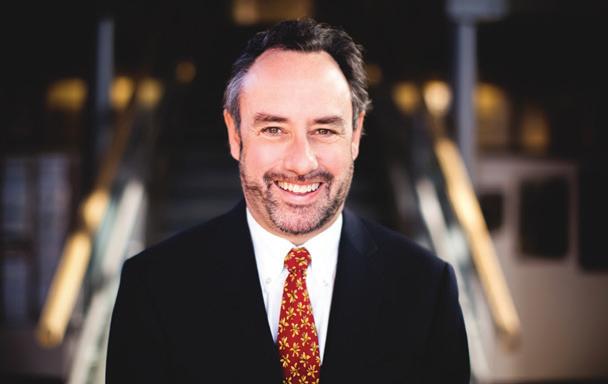
Holding Governor Polis Accountable for his Promises and Policies
By Ben MurreySince the last issue of Independent Inking, the fiscal policy center has been hard at work on two major reports. Each served to educate voters on policy issues affecting them and on the policy proposals put forth by gubernatorial candidates going into this year’s election.

The first, Tax Expenditure Modifications, 2019-2022: Governor Polis’s Record on Special Interest Tax Benefits, explores Governor Polis’s record on his 2018 campaign pledge to reduce special inter est tax giveaways. We found that during his first term, he signed 50 bills into law that, on net, increased such tax benefits by $640 million over 10 years. They created 19 new tax expenditures and increased or extended the benefits for 36. These benefits included tax credits and exemp tions for homeowners who install a Tesla Powerwall at their house and extending the child tax credit to undocumented immigrants.
The second report, Comparing 2022 Gubernatorial Nominees’ Plans to Eliminate Colorado’s Income Tax, reviewed and analyzed each gubernatorial candidate’s policy proposal for eliminating the state income tax. It found that Heidi Ganahl’s plan could work if she can get the political buy-in to make it happen. Conversely, Governor Polis has provided almost no details for how he would accomplish his goal of eliminating the income tax. He has only said that he wants to replace it with a carbon tax; that proposal stands in direct conflict with his goal of moving to 100 percent renewable energy and reducing carbon emissions. If he succeeds at reducing or eliminating emissions, then he loses the revenue with which he proposes to replace income tax revenue. It is a self-defeating plan. We were the first to point that out.
While the summaries of their findings turn out to be rather simple, these reports take a lot of time and effort. The first totaled 65 pages, including 26 pages of appendices and five pages of references. The second came to nearly 30 pages. But when we do these, we do not simply recycle someone else’s talking point. We are creating news with original research and information not produced by our government or anyone else. We put in that effort because we want to get infor mation to Coloradans that they would not see any other way.
The work paid off. Together, they generated at least eight separate news articles from state and national outlets. They were referenced in multiple opinion editorials, includ ing one by the Denver Gazette editorial board. I went on talk radio over a dozen times since September to talk about these reports and other work by the center. In addition, the second report and its findings were referenced multiple times in the CBS gubernatorial debate on October 13th. All this despite Polis’s office call ing our first report “bogus” and dismiss ing Independence Institute as a “wild ly partisan group.” Apparently, educating Coloradans about Polis’s record as governor and evaluating the merits of his policy proposals is now partisanship. Who knew?
Ben Murrey
serves as Director of Fiscal Policy, working to promote fiscal responsibility in Colorado govern ment and to defend the Taxpayer’s Bill of Rights.

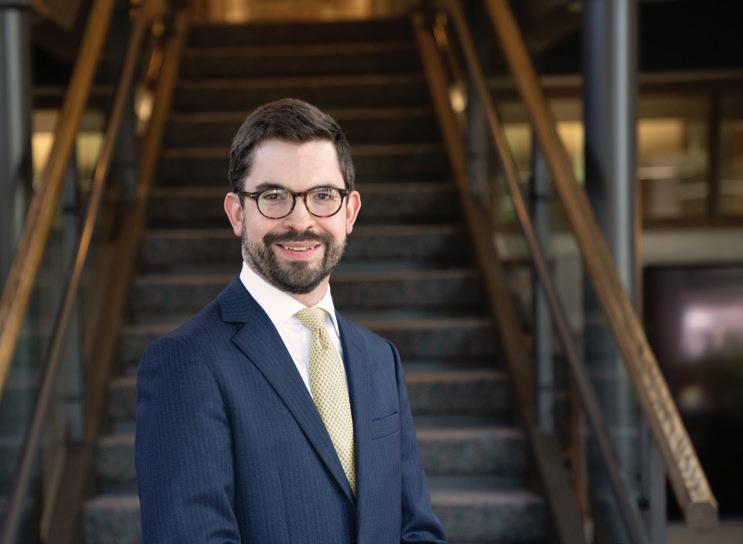
DRCOG Joins The War on Cars
By Joshua SharfJust when you thought it couldn’t get any worse for drivers, the Denver Regional Council of Governments (DRCOG) joined the war on cars.
Several weeks ago, the Council voted to steal $210 million from roads and highways for “mobility,” and to demote relieving traffic congestion on its list of priorities. In theory, this is being done to bring DRCOG into line with Colorado Department of Transportation’s (CDOT) revised priorities.
“Projects include 60 miles of bicycle and pedestrian facilities, enhancing connections to transit; street improvements for pedestrians, cyclists, transit riders and other multimodal travelers; updates to intersections for vehicle and transit services operation; and safety projects to help prevent accidents.” Council President Kevin Flynn argues that the change represents the “new reality” that mobility must focus “on allowing people to move around without automobiles.”
One thing you can be certain of: an increased focus on mobility will leave the region’s drivers increasingly immobile.
From 2010 to 2019, according to US Census statistics, the number of commuters grew from 1.26 million to 1.62 million, an increase of 365,000, or nearly 30%. During that time, despite increased spending on light rail, bike sharing, bike lanes, scooters, and improvements for pedestrians, the percentage of commuters using public trans portation barely budged, from 4.1% to 4.5%, and those commuting by “taxicab, motorcycle, bicycle, or other means” dropped from 1.9% to 1.8%.
But it was during the COVID-19 pandemic restrictions that transit’s fragility became apparent. In 2021, the share of those working from home climbed to 27.5%; the number of commuters driving either alone or in car pools dropped from 80% to 67% because of the sheer volume of drivers. The number of those using public transportation cratered to 1.7%, slightly over 1/3 of what it had been two years before.
RTD’s ridership numbers have not even come close to recovering.
With DRCOG’s action, the doors of one of the last levels of government not ideologically com mitted to making life difficult for drivers slammed shut on them. The federal government has said it will give priority to infrastructure projects that promote transit. CDOT changed its rules late last year partially in response to the state legislature’s SB21-260. Denver has been removing traffic lanes from major surface streets for bikes and bus rapid transit, and has made it clear that drivers are not a priority. And the state failed to ask for a waiver to federal air quality rules, which will likely lead to about a 50-cent per gallon price hike starting early next year.
All this, despite the fact that most commuters would apparently rather live in their cars than give them up. Even with increasing congestion, the number of drivers continues to climb. People simply love and need the flexibility and independence that the automobile gives them, despite the inconvenience it presents to urban planners.
If the problem were the accessibility of public transportation, RTD could shift its focus from trains to buses, and increase bus service to underserved areas. Denver and other local govern ments could make a point of purchasing bus cut-outs, especially along important surface streets, to speed traffic flow around stopped buses.
Instead, the civic planners from Washington on down to your municipality seem intent on telling people how they ought to live, rather than making it easier for them to live the way they clearly want to.
Joshua Sharf

...the civic planners from Washington on down to your municipality seem intent on telling people how they ought to live, rather than making it easier for them to live the way they clearly want to.
Colorado Gives Day supports many genuinely terrific organizations that help Coloradans in need. It also supports organizations hell bent on turning our once liberty-loving state into a workers’ paradise.
So Independence Institute decided to balance the scales. We became the first limited-government charity to participate in Colorado Gives Day! And thanks to you, our supporters, it’s not only raising the needed funding to support our mission, it’s also angering a lot of leftists who are destroying Colorado. You know them—the ones trying to turn Colorado into California.
In fact, we give out a “Californian of the Year” award to the person who best symbolizes the command-and-control takeover of our state. And if we reach our goals on Colorado Gives Day, we send a special gift to each of the nomi nees. (Our governor has been a previous winner)
Please stay tuned—this will be fun and a great way to keep promoting Independence Insitute’s mission of lowering taxes, protecting our rights and keeping Colorado free!
